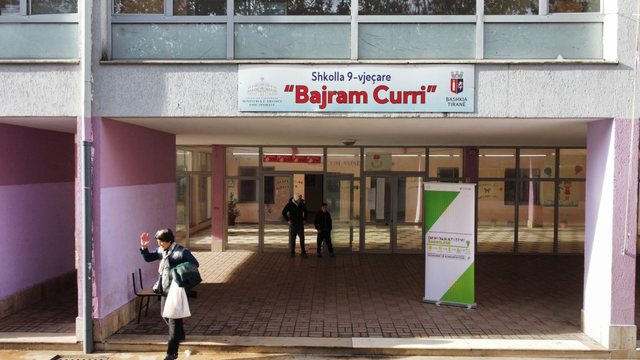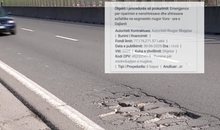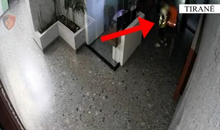
 Flash News
Flash News
Accident at "Shkalla e Tujanit", truck overturns in the middle of the road, driver injured
Vlora by-pass, work delays and cost increases
Milan are expected to give up on the transfer of Granit Xhaka
Inceneratori jashtë funksionit, përfshihet nga flakët fusha e mbetjeve në Elbasan
Accident on the Lezhë-Shëngjin axis, one injured
Segregation encourages Roma and Egyptian children to drop out of school

Lavdija is the grandmother of two children of the Egyptian minority in Tirana, who are enrolled in the Bajram Curri school. The boy is in sixth grade and the girl is in first grade.
Because the son is in prison and divorced, the widow has to take care of the two minors alone. She raises and feeds them even though she says she is very burdened financially and psychologically.
However, when it comes to lessons, Lavdija is demanding and has a special attention for the two minors. She wants them to do well in their studies, while she suspects that because they are part of the minority, the grandchildren do not receive the proper attention in school.
She says that her grandson is always blamed when he had problems with the majority children and she feels that her granddaughter in the first grade is not given importance and has fallen behind in her studies. The woman justifies the teachers with the heavy workload and the high number of students, but adds that she feels that there is a different treatment.
"I like her as a teacher because she is very demanding and I thank her for that, but she has many shortcomings, there are shortcomings", she said, trying to soften her attitude.
Glory is convinced that they are not treated as equals.
"It cannot be equal because here in our country the race of Egyptians and Roma is ignored, there is more contempt", she stressed.
Based on official data, the 9-year-old school "Bajram Curri" in the Allias neighborhood of the capital has over 54 percent of students from the Egyptian and Roma minority.
According to Commissioner for Protection from Discrimination Robert Gajda, such a concentration should be considered segregation.
"We know different realities, that the ratio was over 50% and it was considered segregation, but we also know about different ratios of children who, even though they were below 50%, were still considered segregation", he said.
Gajda emphasized that differentiated treatment is present and starts with the registration of children in schools.
Data obtained by BIRN from educational directorates and experts on the problem show that segregated schools have a high dropout rate and also poor results.
However, the segregation and different treatment of children of the Roma and Egyptian minorities is denied by the Ministry of Education.
"Regarding the above, we inform you that there are no differences or divisions in schools regarding Roma and Egyptians," it says in response to a request for information.
Segregation begins with residence
Two years ago, Albania was found guilty of segregating Roma and Egyptian children by the European Court of Human Rights, after being sued by civil society activists for the case of the "Naim Frashëri" school in Korça.
Gjykata gjeti se shteti shqiptar kishte shkelur nenin 1, të protokollit 12 të Konventës Evropiane për të Drejtat e Njeriut dhe urdhëroi një dëmshpërblim prej 4500 eurosh për 5 familje që ngritën në vitin 2017 padinë nëpërmjet Qendrës Evropiane për të Drejtat Rome.
Vendimmarrja e GJEDNJ-së nuk e ka ndryshuar shumë situatën në shkollat e vendit. Rasti i shkollës Bajram Curri në kryeqytet është një shembull, por raste të ngjashme hasen edhe në qytete të tjera me prani të pakicave kulturore.
Komisioneri për Mbrojtjen nga Diskriminimi, Robert Gajda shpjegon se fenomeni është i pranishëm ndërsa segregimi fillon që me krijimin vendbanimeve të segreguara.
“Gjëja tjetër që vihet re është që kryesisht segregimi ndodh edhe në baza vendbanimi, pra ne kemi vendbanime të segreguara, që do të thotë që kemi vendbanime me një përqendrim shumë të madh me minoritetin rom edhe egjiptian dhe për rrjedhojë kjo reflektohet pastaj edhe në institucionet arsimore”, tha ai.
Gajda theksoi se kjo duhet t'i kishte vënë në lëvizje institucionet arsimore, për të mundësuar një ndarje të ndryshme dhe për të mos lejuar krijimin e shkollave të segreguara. Megjithatë, ai thotë se për institucionet kjo nuk ka qenë shqetësim.
“Institucionet nuk janë shqetësuar ndonjëherë për t'i parë këto raporte dhe për rrjedhojë për të tentuar që të bëjnë një rishpërndarje më të mirë të fëmijëve nëpër shkollat e qyteteve”, tha ai.
Përkundrazi Gajda theksoi se është vërejtur segregim i qëllimshëm nga drejtuesit e shkollave, për sa kohë këta kishin në dorë regjistrimin e fëmijëve.
“Sjellja e drejtorëve ka bërë që kur ka pasur fëmijë romë edhe egjiptianë që kanë qenë në një vendbanim krejt tjetër dhe në një shkollë krejt tjetër nuk i kanë regjistruar në shkollën që i takonte, por i kanë regjistruar pikërisht në shkollën ku ka një përqendrim të madh romësh dhe egjiptianësh”, tha Komisioneri.
Ai shpjegon se fenomeni ka edhe krahun e kundërt, kur fëmijët e shumicës regjistrohen larg zonave të banimit për të shmangur shkollat me prani të pakicës.
Gajda tha se kjo ndarje ndikon më pas edhe në cilësinë e arsimit që fëmijët marrin. Ai shpjegon se shkollat e segreguara rezultojnë në fund të renditjeve për sa i përket cilësisë, ndërsa kanë edhe një sërë problemesh të tjera.
“Për më tepër gjëja që ne kemi konstatuar është që dhe në renditjen e cilësie së shkollave që bëjnë ZVA-të shkollat që ne i kemi konstatuar të segreguara rezultojnë në vendet e fundit, ç'ka do të thotë që edhe cilësia e mësimdhënies pastaj në shkollat e segreguara neve na ka rezultuar që është nga më e dobët”, shpjegoi ai.
Segregimi vret besimin te arsimi
Xhuljana Sakollari, një aktiviste e Qendrës Për Advokim Social e cila punon me familjet Rome dhe Egjiptiane prej 10 vitesh tregon se segregimi ndikon shumë tek nxënësit dhe familjet e tyre, duke sjellë ndër të tjera braktisje të shkollës.
"The fact that children of this category are often excluded and discriminated against also affects the relationship between parents and children in terms of how the latter project their children's future in relation to education," Sakollari told BIRN.
Even parents of minority children feel the differentiation that is done to them. They say they are no longer satisfied with the way they are treated in schools. Fatmir Zyberi, the father of seven children, told BIRN that in the school where his children are enrolled, they are not only Roma and Egyptian, but the children do not integrate with the other party due to discrimination.
"I have dissatisfaction with the children in the school, I don't see them improve and they don't focus on the children of the community," said Zyrberi. "Discrimination and bullying continues to be active at my children's school," he added.
Many parents of Roma and Egyptian children, with whom BIRN spoke in the Shkoza area, are concerned that their children do not achieve results in school. They say that the children do not learn to read and write and that they draw during the lesson because they find it difficult to understand the lesson.
BIRN found that the number of absences, school dropouts and academic results are always at negative levels in schools that are segregated or where there is a high presence of minorities.
According to data from the Education Directorate, the "Bajram Curri" school was abandoned by 50 percent of students in 2022 and the number increased to 57 percent last year. Also, the students of this school are more absent and have a rather low level of secondary school attendance.
Xhuljana Sakollari said that segregation directly affects the lives of Roma children and dropping out of school at a young age. She emphasized that due to the differentiation in the school and the quality of teaching, many parents and the students themselves lose faith that education will affect their future. Reporter.al
Latest news








Golem and Qerret without water at the peak of the tourist season
2025-07-01 21:09:32

Euractiv: Italy-Albania migrant deal faces biggest legal challenge yet
2025-07-01 20:53:38
BIRN: Brataj and Fevziu victims of a 'deepfake' on Facebook
2025-07-01 20:44:00

Vlora by-pass, work delays and cost increases
2025-07-01 20:24:29



Milan are expected to give up on the transfer of Granit Xhaka
2025-07-01 19:41:25


The silent but rapid fading of the towers' euphoria
2025-07-01 18:58:07
Donald Trump's daughter says 'goodbye' to June with photos from Vlora
2025-07-01 18:48:47

Tirana vote recount, Alimehmeti: CEC defended manipulation
2025-07-01 18:15:05

Left Flamurtari, striker signs with another Albanian club
2025-07-01 17:43:14
Accident on the Lezhë-Shëngjin axis, one injured
2025-07-01 17:19:35
June temperature records, Italy limits outdoor work
2025-07-01 17:03:15

Meet Kozeta Miliku, named one of the top five scientists in Canada
2025-07-01 16:32:12
"Arsonist" arrested for repeatedly setting fires in Vlora (NAME)
2025-07-01 16:29:45

The ecological integrity of the Vjosa River risks remaining on paper
2025-07-01 16:09:40
Heat Headache/ Causes, Symptoms and Measures You Should Take
2025-07-01 16:01:13
UN: The world must learn to live with heat waves
2025-07-01 15:54:50

Three cars collide in Tirana, one of them catches fire
2025-07-01 15:38:16

Shehu: Whoever doesn't want Berisha, doesn't want the opposition 'war'!
2025-07-01 15:19:20
Berisha requests the OSCE Assembly: Help my nation vote freely
2025-07-01 15:11:46
Be careful with medications: Some of them can harm your sex life
2025-07-01 15:00:32

'Golden Bullet'/ Lawyers leave the courtroom, Altin Ndoc's trial postponed again
2025-07-01 14:44:52
EU changes leadership, Kosovo in a number of places
2025-07-01 14:40:01
Should we drink a lot of water? Experts are surprised: You risk hyponatremia
2025-07-01 14:30:20



Lëpusha beyond Rama's postcards: A village that is being silently abandoned
2025-07-01 13:41:56
Scorching temperatures in France close the Eiffel Tower
2025-07-01 13:29:35
Media: China, Iran and North Korea, a threat to European security
2025-07-01 13:20:12
Albania drops in global index: Less calm, more insecure
2025-07-01 13:09:35
Road collapses, 5 villages in Martanesh risk being isolated
2025-07-01 13:03:04

Këlliçi: Opposition action to be decided in September
2025-07-01 12:48:49
Four tips for coping with the heat wave
2025-07-01 12:38:53
Car hits pedestrian on Transbalkan road
2025-07-01 12:27:09
Authors of 9 robberies, Erjon Sopoti and Abdullah Zyberi arrested
2025-07-01 12:15:56

He abused his minor daughter, this is a 36-year-old man in custody in Fier
2025-07-01 11:50:34
The constitution of the Kosovo Assembly fails for the 40th time
2025-07-01 11:40:08




EU confirms support for the Western Balkans
2025-07-01 10:50:45
Serious in Fier! Father sexually abuses his minor daughter
2025-07-01 10:32:33
One year since the passing of the colossus of Albanian literature, Ismail Kadare
2025-07-01 10:25:26


They supplied the 'spaçators' with drugs, two young men are arrested in Tirana
2025-07-01 09:54:09
Europe is "scorching", how dangerous are high temperatures?
2025-07-01 09:48:56


Nigel Farage in Albania: but why?
2025-07-01 09:13:12
Xama: The "Partizani" dossier is quite weak and without facts!
2025-07-01 09:04:47

Foreign exchange, the rate at which foreign currencies are sold and bought
2025-07-01 08:35:39
Fabricators again warn of factory closures and job cuts
2025-07-01 08:21:30
Horoscope, what do the stars have in store for you today?
2025-07-01 08:08:59
Scorching hot, temperatures reaching 40°C
2025-07-01 07:57:12
Morning Post/ In 2 lines: What mattered yesterday in Albania
2025-07-01 07:42:59
Recount after May 11, Braho: I had no expectations for massive vote trafficking
2025-06-30 22:54:18

Second hearing on the protected areas law, Zhupa: Unconstitutional and dangerous
2025-06-30 22:18:46



Israel-Iran conflict, Bushati: Albanians should be concerned
2025-06-30 21:32:42

Fuga: Journalism in Albania today in severe crisis
2025-06-30 21:07:11
"There is no room for panic"/ Moore: Serbia does not dare to attack Kosovo!
2025-06-30 20:49:53

Temperatures above 40 degrees, France closes nuclear plants and schools
2025-06-30 20:28:42
Lavrov: NATO is risking self-destruction with new military budget
2025-06-30 20:13:54
Turkey against the "Bektashi state" in Albania: Give up this idea!
2025-06-30 20:03:24

Accused of sexual abuse, producer Diddy awaits court decision
2025-06-30 19:40:44


